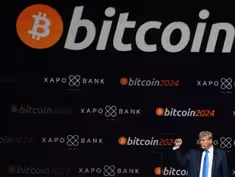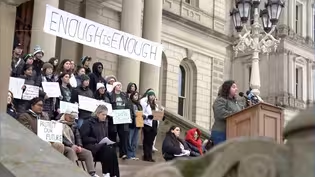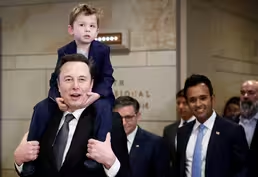
Trump picks could radically shift intelligence agencies
Clip: 12/5/2024 | 6m 9sVideo has Closed Captions
How Trump's intelligence agency picks could radically shift the way they operate
Many of the people President-elect Trump has selected for his next administration have promised to shake up long-held norms. His picks to lead agencies that will oversee the nation’s national security, intelligence and law enforcement communities have repeatedly expressed contempt towards the agencies they are nominated to run. Laura Barrón-López discussed more with John Sipher.
Problems playing video? | Closed Captioning Feedback
Problems playing video? | Closed Captioning Feedback
Major corporate funding for the PBS News Hour is provided by BDO, BNSF, Consumer Cellular, American Cruise Lines, and Raymond James. Funding for the PBS NewsHour Weekend is provided by...

Trump picks could radically shift intelligence agencies
Clip: 12/5/2024 | 6m 9sVideo has Closed Captions
Many of the people President-elect Trump has selected for his next administration have promised to shake up long-held norms. His picks to lead agencies that will oversee the nation’s national security, intelligence and law enforcement communities have repeatedly expressed contempt towards the agencies they are nominated to run. Laura Barrón-López discussed more with John Sipher.
Problems playing video? | Closed Captioning Feedback
How to Watch PBS News Hour
PBS News Hour is available to stream on pbs.org and the free PBS App, available on iPhone, Apple TV, Android TV, Android smartphones, Amazon Fire TV, Amazon Fire Tablet, Roku, Samsung Smart TV, and Vizio.
Providing Support for PBS.org
Learn Moreabout PBS online sponsorshipGEOFF BENNETT: Many of the people president-elect Trump has selected to head up his next administration have promised to shake up long-held norms that -- and that could have wide-ranging implications for U.S. security interests.
Our Laura Barron-Lopez delves more into those selections.
LAURA BARRON-LOPEZ: Donald Trump's picks to lead agencies that will oversee the nation's national security, intelligence and law enforcement communities have repeatedly expressed contempt towards the agencies they are nominated to run.
For more, I'm joined by John Sipher, a retired CIA operative who worked for nearly three decades at the agency and now is a fellow at The Atlantic Council.
John, thank you so much for joining us.
JOHN SIPHER, Former CIA Officer: Nice to be here.
LAURA BARRON-LOPEZ: First, let's talk about Tulsi Gabbard and Kash Patel.
Tulsi Gabbard is nominated to be the director of national intelligence, Kash Patel to be the director of the FBI.
Both have talked about the CIA and other agencies, including the ones they would lead, being a part of the deep state.
Gabbard in particular has labeled the CIA and Defense Department as rogue, filled with rogue agents.
So what impact would both of these people have on the agencies and the intel community writ large?
JOHN SIPHER: Well, it's not really clear with these people yet whether their goal is just to get real loyalty for Donald Trump or whether it's to destroy these organizations, because there's been different views with this.
Steve Bannon and others said they want to destroy the administrative state.
Some of the comments that Patel and others have made suggest that, that they want to fire lots of people.
But that term rogue is really interesting to a former intelligence officer, because Gabbard and Trump both called the CIA a rogue organization.
In the 1970s, famously, Senator Frank Church, who headed a commission to investigate the CIA and FBI, called the CIA a rogue elephant.
And his point was, the CIA was involved in both illegal and unethical activities through the 1950s and 1960s.
And so they investigated that at the time.
Later on, he came back and said, hey, I changed my opinion this.
It's not that the CIA was necessarily a rogue element.
It was that presidents had unfiltered power.
Presidents could just ask the CIA to take action that they didn't want to go to Congress with it, they didn't want to go to the public with.
And so this was more about untethered presidential power.
LAURA BARRON-LOPEZ: How could an Intelligence Director Gabbard or an FBI Director Patel end up impacting information gathering and relationships with sources and spies?
JOHN SIPHER: Well, that's an interesting point.
So, yes, the CIA runs large technical operations.
It has spies around the world, large analytic cadre.
Foreign organizations and foreign partners that we work with provide, frankly, the bulk of the information that this government gets.
You know, our friends in Britain, our friends around the world, partners we work with share information that's very sensitive for them.
So they are going to have to ask themselves, are we now working with a professional, serious organization?
Or are we working with an organization that's about partisan politics and cronyism and corruption?
And so I worry that some of the people who give us really important information are going to hesitate to do that if it is seen that these organizations are no longer professional, but they're more just partisan weapons for President Trump.
LAURA BARRON-LOPEZ: President-elect Trump's transition team signed a document with the Justice Department, a memorandum of understanding.
And essentially what that does is that people who need security clearances will now be able to get security clearances and be investigated for those clearances.
But that doesn't mean that all of Donald Trump's nominees are going to necessarily undergo a thorough, broad FBI background check.
And I spoke to Frank Montoya earlier today, former FBI special agent, and he said that there is a big difference between FBI background checks and those conducted by outside sources.
FRANK MONTOYA JR., Former FBI Official: It's really, really important.
And farming it out to another agency or doing it through a private entity, you're not going to get the objective perspective that you're going to get from the FBI.
The reality is that the folks that are conducting these background investigations, a lot of them may even be Trump supporters.
But the fact is, they do their job in a neutral and objective way.
LAURA BARRON-LOPEZ: A source close to Donald Trump's transition told me that, if the president-elect doesn't want his nominees and the others that go through Senate confirmation to undergo FBI background checks, then they won't undergo FBI background checks.
So what does that mean if these nominees and others don't ultimately go through that kind of check?
JOHN SIPHER: Well, there's two things here.
My understanding is, this memorandum is to provide FBI background checks for nominees so that the Senate can do its constitutional duty when they decide whether to approve or not approve these nominees.
There's still another step yet.
For intelligence professionals that work in the intelligence community, background checks are even a step further.
The intelligence community often do their own background checks, not just they have the FBI go through things.
So it's a full background check.
It's polygraphs.
It's going through your bank accounts.
It's you having to report all foreigners, all places you have lived.
All of your professional correspondence is -- has to be looked at.
So it's really intrusive.
And, frankly, it's failing leadership 101.
So if you're going to come in and lead an organization that has every person from the lowest to the highest has to go through this every day for their entire career, and you say that you don't need a background check, that's just failing leadership 101.
It's also these organizations in the intelligence community are like the military.
They're hierarchical.
People get more senior positions by experience and expertise.
And when you just parachute people in over the top to lead these organizations that don't have any of that experience or expertise and don't -- aren't willing to do these background checks, you really are in a tough position in terms of just leading these organizations.
LAURA BARRON-LOPEZ: John Sipher, thank you for your time.
JOHN SIPHER: My pleasure.
Thank you.
CRYPTO’S RISE (YAFFE-BELLANY DIS)
Video has Closed Captions
Clip: 12/5/2024 | 5m 12s | CRYPTO’S RISE (YAFFE-BELLANY DIS) (5m 12s)
Documentary explores migrant family separation policy
Video has Closed Captions
Clip: 12/5/2024 | 7m 10s | Documentary explores migrant family separation policy of first Trump administration (7m 10s)
Family of Gaza chef killed in strike says he was targeted
Video has Closed Captions
Clip: 12/5/2024 | 9m 19s | Family of Palestinian chef killed in Israeli drone strike says he was targeted (9m 19s)
In 'Run, Hide, Fight,' students report on gun violence
Video has Closed Captions
Clip: 12/5/2024 | 3m 42s | In 'Run, Hide, Fight,' student journalists report on how gun violence affects youth (3m 42s)
Musk, Ramaswamy try to build support for slashing government
Video has Closed Captions
Clip: 12/5/2024 | 5m 21s | Musk, Ramaswamy meet with lawmakers to build support for slashing government programs (5m 21s)
News Wrap: Macron vows to stay in office after PM's ouster
Video has Closed Captions
Clip: 12/5/2024 | 4m 48s | News Wrap: Macron vows to stay in office after French PM's ouster (4m 48s)
Syrian rebels capture Hama, another blow to Assad government
Video has Closed Captions
Clip: 12/5/2024 | 3m 28s | Syrian rebels capture city of Hama, dealing another serious blow to Assad government (3m 28s)
Providing Support for PBS.org
Learn Moreabout PBS online sponsorship
- News and Public Affairs

FRONTLINE is investigative journalism that questions, explains and changes our world.

- News and Public Affairs

Amanpour and Company features conversations with leaders and decision makers.












Support for PBS provided by:
Major corporate funding for the PBS News Hour is provided by BDO, BNSF, Consumer Cellular, American Cruise Lines, and Raymond James. Funding for the PBS NewsHour Weekend is provided by...







